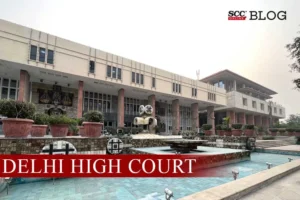Delhi High Court: This appeal was filed under Section 91 of the Trade Marks Act, 1999 (‘the Act’) read with Rule 156 of the Trade Mark Rules, 2017 (‘the Rules) assailing order dated 02-02-2023 passed by Respondent 2, the Registrar of Trade Marks, Delhi, rejecting the opposition of appellant, Premier SPG and WVG Mills Pvt. Ltd to register respondent’s mark
Background
Respondent 1 filed application for registration of the said mark claiming, “proposed to be used” and the application was opposed by appellant on 07-09-2015 on the ground that the mark was phonetically, visually, structurally, and deceptively similar to its mark ‘PREMIER’ which was conceived, coined, and adopted in 1949, and registered in various classes from 1980 onwards. Appellant was manufacturers, exporters, marketers of yarn, clothing, hosiery including suiting, shirts, ready-made garments, dhotis, textiles under various marks etc. The marks
Respondent 1 submitted that they were the organizing body of ‘Barclays Premier League’ and controlled the rights of the League including its rules, broadcast, and commercial rights. In India, respondent was the registered proprietor of the ‘BARCLAYS PREMIER LEAGUE’ mark
Appellant submitted that the Registrar of Trade Marks erred in his conclusion that “it was palpable that there was no similarity between the marks phonetic, visual, or structural. The only common features between the two marks were the word ‘PREMIER’, and the said word ‘PREMIER’ was generic word and no one could have monopoly over the said word, nor could claim exclusivity on it”.
Comparison of appellant’s marks and Respondent 1’s mark was as follows:
|
Appellant’s Marks |
Respondent 1’s Mark |
Analysis, Law, and Decision
The Court opined that prima facie there was no deceptive similarity between the two marks and the only commonality between the same was the use of the word ‘PREMIER’. Moreover, the word ‘PREMIER’ was suffixed by the word ‘LEAGUE’ in Respondent 1’s mark and had a device of a lion wearing a crown and standing over a football, which was indicative of the nature of the services being provided by respondent in the industry of football. On the other hand, ‘PREMIER’ as used in appellant’s mark was of a completely different font and style and had a small flower device on top of the word. The Court thus concluded that there was no deceptive similarity on a bare perusal of the marks.
The Court relied on Vasundhara Jewellers (P) Ltd. v. Kirat Vinodbhai Jadvani, 2022 SCC Online Del 3370, wherein it was observed that “examining the dominant part of a trade mark for the sake of comparison of the conflicting marks was solely for the purpose of determining whether the marks were deceptively similar, when viewed as a whole”. The Court thus opined that the rule of anti-dissection would clearly apply to the two composite device marks being compared.
The Court opined that the device mark of respondent could not be dissected to pluck out the word ‘PREMIER’ and then compared with appellant’s registered mark. Appellant’s registered mark was only a device mark and not a word mark and thus, appellant could not have a monopoly over the word ‘PREMIER’ considering it was a word of general use. It would be difficult to accept appellant’s contention that ‘PREMIER’ was the dominant mark of respondent’s mark and thus in conflict with appellant’s mark. Thus, respondent’s mark could not be severed, excised from its associated word ‘LEAGUE’ since it derived its context from it. ‘PREMIER’ referred to the category of a League, which in context of football had acquired and amassed worldwide recognition, goodwill, and immediate re-call.
The Court relied on Pidilite Industries Ltd. v. Vilas Nemichand Jain, 2015 SCC OnLine Bom 4801 and opined that “mere evidence of invoices, financial figures, and sales was not enough to show distinctiveness, but what needed to be achieved was that the mark had acquired secondary meaning and displaced the primary descriptive meaning of the mark”.
The Court observed that an application in Class 25 was clearly for the purposes of selling merchandise, which is a standard industry practice for premium sports brands, and it is normal for them to protect the same. The selling of sports merchandise had become concomitant to the business and revenues of sporting organizations and the greater reputation and goodwill that the sporting event had, the greater was the fan craving for the merchandise.
The Court opined that there was a lack of opposition by appellant to the earlier registration of respondent’s mark ‘BARCLAYS PREMIER LEAGUE’
[Premier SPG and WVG Mills (P) Ltd. v. Football Association Premier League Ltd., 2024 SCC OnLine Del 358, decided on 22-01-2024]
*Judgment authored by: Justice Anish Dayal
Advocates who appeared in this case :
For the Appellant: N. Mahabir, Advocate
For the Respondents: Harish Vaidyanathan Shankar, CGSC; Peeyoosh Kalra, C.A. Brijesh, Krisna Gambhir, Simranjot Kaur, Srish Kumar Mishra, Alexander Mathai Paikaday, Krishnan V., Advocates

